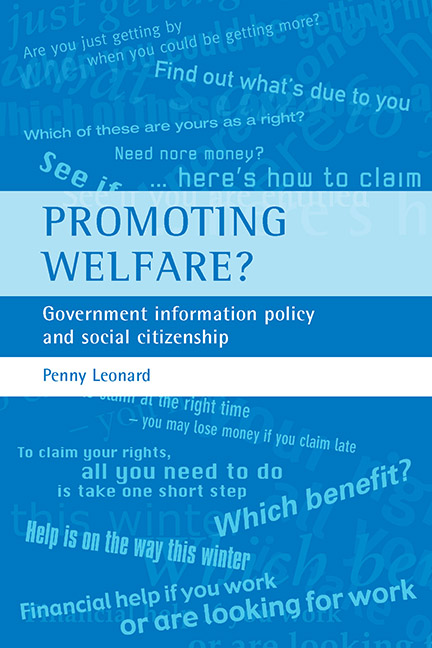Book contents
- Frontmatter
- Contents
- Foreword
- Preface
- List of abbreviations
- one Introduction
- two Citizenship
- three Information
- four Social democracy and information
- five The New Right and information
- six New Labour and information
- seven Case study A: In-work benefits for low wage earners
- eight Case study B: Means-tested benefits for older people
- nine Information for citizenship?
- References
- Appendix A Government expenditure on publicity for social security benefits (1973-98/99)
- Appendix B Sample leaflets and posters
- Index
- Also available from The Policy Press
- Frontmatter
- Contents
- Foreword
- Preface
- List of abbreviations
- one Introduction
- two Citizenship
- three Information
- four Social democracy and information
- five The New Right and information
- six New Labour and information
- seven Case study A: In-work benefits for low wage earners
- eight Case study B: Means-tested benefits for older people
- nine Information for citizenship?
- References
- Appendix A Government expenditure on publicity for social security benefits (1973-98/99)
- Appendix B Sample leaflets and posters
- Index
- Also available from The Policy Press
Summary
This study of government information policy, as a way of exploring attitudes to and definitions of citizenship, started from the premise that information is a prerequisite for exercising the rights of citizenship. This chapter explores broad issues concerning information that affect policy making and, therefore, adds to an understanding of how decisions are taken about information provision.
It is important to be clear what is meant by ‘information’ in this book, since it is a word that can have different meanings for different groups and in different contexts. Information is an elusive concept. To try to define it raises questions of a philosophical and legal nature and highlights paradoxes about its common usage. Raab (1994, p 342) asks:
What do you get when you get ‘information’? What can you do with it? What else do you need to know, as a consumer or citizen? And who is to say what you need, or might merely want, to know?
There is the common assumption that information is available and costless (Strauss, 1977) but, as Steele (1996) maintains (and this study confirms), it is a resource which needs to be managed. In this book ‘information’ is generally used to mean any material or activity that brings to the public or individuals’ attention the existence of services and benefits to which they may be entitled. In assessing what constitutes information, or what help is provided, models of information – giving reflect both perceived levels of need and categories of service provision. They range from ‘raw’ information (that is, not specific to individual circumstances) from a variety of sources, through guidance in looking at individual options for action, to representation or advocacy in pursuing claims. All may be loosely labelled ‘information’ and are included here.
This chapter begins by summarising why information policy was chosen as a way to understand attitudes towards – and definitions of – citizenship. It continues by considering governments’ attitudes to information in a ‘culture of secrecy’ before discussing the nature of the concept and whether it can be considered a public good. In order to set the scene for the following chapters, the next sections consider sources of information and models of claiming behaviour.
Why information?
There are several reasons for choosing to study information policy as a way of assessing government attitudes to citizenship.
- Type
- Chapter
- Information
- Promoting Welfare?Government Information Policy and Social Citizenship, pp. 23 - 36Publisher: Bristol University PressPrint publication year: 2003



